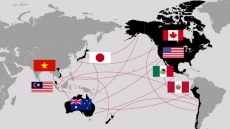STOCKHOLM — A professor emeritus at Queen's University in Kingston, Ont. — the former director of the Sudbury Neutrino Observatory in northern Ontario — is a co-winner of the 2015 Nobel Prize in Physics for his work on tiny particles known as neutrinos.
Arthur McDonald was roused from sleep at about 5 a.m. today by a phone call from the Nobel Prize committee telling him the news.
"I was a little surprised," he said in a telephone interview from Kingston, laughing with joy. "I am overwhelmed, but excited."
The first thing he did as a Nobel Prize winner was hug his wife.
"Thank you," he told her.
McDonald and Japanese scientist Takaaki Kajita were cited for the discovery of neutrino oscillations and their contributions to experiments showing that neutrinos change identities.
"The discovery has changed our understanding of the innermost workings of matter and can prove crucial to our view of the universe," the Royal Swedish Academy of Sciences said in announcing the award early Tuesday.
McDonald said being named by the committee is a "very daunting experience, needless to say."
"Fortunately, I have many colleagues as well who share this prize with me."
McDonald said they have put in a "tremendous amount of work" and that he benefited from having a "very friendly collaboration among scientists from Canada, the United States, Britain and Portugal."
He said that group will help him "enjoy the moment" when he has a chance to speak with them.
McDonald said there was a "eureka moment" when they discovered that neutrinos were able to change from one type to another in travelling from the sun to the Earth.

"Neutrinos are among the fundamental particles (that) we do not know how to subdivide any further. Therefore, their position within the models of physics at the most fundamental level is very important," he said.
"When you do not know whether they have mass, it's otherwise difficult to understand how to incorporate them into those theories that give us a more complete understanding of the world of physics at the most fundamental level. Discovering this property helps us tremendously in this regard."
McDonald, 72, is a native of Sydney, N.S. who studied at Dalhousie University in Halifax in the mid-60s and later at the California Institute of Technology. He was made an officer of the Order of Canada in 2006.
McDonald and Kajita, the director of the Institute for Cosmic Ray Research and professor at the University of Tokyo, will split the prize money, the equivalent of about $1.3 million Cdn (8 million Swedish kronor).
Kajita seemed flummoxed at a news conference organized by his university. "My mind has gone completely blank," he said after taking the stage. "I don't know what to say."
After getting his composure back, he stressed that many people had contributed to his work, and that there was much work still to do.
"The universe where we live in is still full of unknowns," he said. "A major discovery cannot be achieved in a day or two. It takes a lot of people and a long time. I would like to see young people try to join our pursuit of mystery-solving."
Neutrinos are minuscule particles created in nuclear reactions, such as in the sun and the stars.
For decades the neutrino remained a hypothetical particle until American researchers proved that it was real in 1956.
There are three kinds of neutrinos, and the laureates showed they oscillate from one type to another, dispelling the long-held notion that they were massless.
Kajita showed in 1998 that neutrinos captured at the Super-Kamiokande detector in Japan underwent a metamorphosis in the atmosphere, the academy said.
Three years later, in Canada, while working at the Sudbury Neutrino Observatory, McDonald found that neutrinos coming from the sun also switched identities.
"A far-reaching conclusion of the experiments is that the neutrino, for a long time considered to be massless, must have mass," the academy said.

McDonald said that scientists would still like to know the actual masses of the various forms of neutrino. And experiments are looking at whether there are other types of neutrinos beyond the three clearly observed.
The idea that neutrinos could transform from one type into another was first put forward by the Italian physicist Bruno Pontecorvo in the late 1950s, but scientists' understanding of the process was rather vague until Kajita announced his discovery in 1998, said Antonio Ereditato, director of the Albert Einstein Center for Fundamental Physics at the University of Bern, Switzerland.
"This was a big shock because he proved in a statistically significant manner ... that neutrinos oscillate," said Ereditato. "Then Art McDonald explored another channel using solar neutrinos. It came after Kajita but he also proved neutrino oscillation in another channel. The two deserved this award."
Neutrinos are the second-most abundant particles in the universe after photons, "so any property of neutrinos can have dramatic repercussions on the life of the universe and on its evolution," he said. "This is really one of the milestones in our understanding of nature."
The University of Tokyo said in a statement congratulating Kajita that he was one of the students of 2002 Nobel physics winner Masatoshi Koshiba, who also has contributed to Japan's neutrino research.
On Monday, the Nobel Prize in medicine went to scientists from Japan, the U.S. and China who discovered drugs that are now used to fight malaria and other tropical diseases.
The prize announcements continue with chemistry on Wednesday, literature on Thursday, the Nobel Peace Prize on Friday and the economics award next Monday.
”It’s ironic, in order to observe the sun you have to go kilometers under ground.” Arthur McDonald: https://t.co/HEt4wAqa2c #NobelPrize
— The Nobel Prize (@NobelPrize) October 6, 2015
Each winner will also get a diploma and a gold medal at the prize ceremony on Dec. 10.
FIVE THINGS TO KNOW ABOUT 'LITTLE NEUTRAL ONES' ALSO KNOWN AS NEUTRINOS
What are they? Neutrinos are one of the fundamental particles that make up the universe, but they're also among the least understood and for decades remained hypothetical. Neutrinos are minuscule and created in nuclear reactions, such as in the sun and the stars. They are similar to the electron, but they don't carry an electric charge. Because they're electrically neutral, they are unfazed by electromagnetic forces that act upon electrons.
What does affect them? Neutrinos are affected only by a "weak" sub-atomic force of much shorter range than electromagnetism, and are therefore able to pass through great distances in matter without being affected by it. If neutrinos have mass, they also interact gravitationally with other massive particles, but gravity is by far the weakest of the four known forces.
How many types of neutrinos are they? There are three types and they oscillate from one type to another, dispelling the long-held notion that neutrinos are massless. Neutrinos are so small that about a billion neutrinos pass through a human thumb every second.
What did Canada discover about neutrinos? In 2001, while working at the Sudbury Neutrino Observatory, Canadian Nobel Prize winner Arthur McDonald found that neutrinos coming from the sun didn't disappear — some just changed identities. He and Takaaki Kajita, a Japanese colleague with whom he shares the Nobel Prize, gave rise to the conclusion that neutrinos have mass.
Fun fact: Neutrino means "little neutral one" in Italian.
List of Canadians who have won the Nobel Prize
The illustrious list of Nobel Prize winners features the names of 18 Canadians who have claimed honours in every field for which an award is granted. These include the man who discovered today's most common diabetes treatment, the woman hailed as the master of the contemporary short story, and most recently a Nova Scotia physicist partially credited with discovering neutrino oscillations. Here is a list of Canadian laureates as documented on the official Nobel Prize website:
Congratulations to #queensu Prof Emeritus Art McDonald, winner of an @NobelPrize for Physics http://t.co/cxsPcSM11t pic.twitter.com/9phjYB8FrQ
— Queen's University (@queensu) October 6, 2015
1923: Frederick G. Banting, Nobel Prize in Medicine for the "discovery of insulin"
1949: William F. Giauque, Nobel Prize in Chemistry for "contributions in the field of chemical thermodynamics, particularly concerning the behaviour of substances at extremely low temperatures"
Let's be proud of our fellow Arthur B. McDonald for his @NobelPrize in Physics, an accomplished scientist and Officer of the #OrderofCanada.
— David Johnston (@GGDavidJohnston) October 6, 2015
1957: former Prime Minister Lester Bowles Pearson, Nobel Peace Prize for his role in defusing the 1956 Suez crisis
1966: Charles B. Huggins, Nobel Prize in Medicine for "his discoveries concerning hormonal treatment of prostatic cancer"
1976: Saul Bellow, Nobel Prize in Literature for "the human understanding and subtle analysis of contemporary culture that are combined in his work"
1981: David H. Hubel, Nobel Prize in Medicine for "discoveries concerning information processing in the visual system"
1983: Henry Taube, Nobel Prize in Chemistry for "his work on the mechanisms of electron transfer reactions, especially in metal complexes"
1989: Sidney Altman, Nobel Prize in Chemistry for "discovery of catalytic properties of RNA
1990: Richard E. Taylor, Nobel Prize in Physics for "investigations concerning deep inelastic scattering of electrons on protons and bound neutrons, which have been of essential importance
for the development of the quark model in particle physics"
1992: Rudolph A. Marcus, Nobel Prize in Chemistry for "his contributions to the theory of electron transfer reactions in chemical systems"
1994: Bertram N. Brockhouse, Nobel Prize in Physics for "the development of neutron spectroscopy"
1996: William Vickrey, Nobel Prize in Economic Sciences for "contributions to the economic theory of incentives under asymmetric information"
1997: Myron S. Scholes, Nobel Prize in Economic Sciences for "a new method to determine the value of derivatives"
1999: Robert A. Mundell, Nobel Prize in Economic Sciences for "his analysis of monetary and fiscal policy under different exchange rate regimes and his analysis of optimum currency areas"
2009: Willard S. Boyle, Nobel Prize in Physics for "the invention of an imaging semiconductor circuit - the CCD sensor"
2011: Ralph M. Steinman, Nobel Prize in Medicine for "his discovery of the dendritic cell and its role in adaptive immunity"
2013: Alice Munro, Nobel Prize in Literature for being the "master of the contemporary short story"
”Kind of unbelievable!” Takaaki Kajita on being awarded the 2015 #NobelPrize in Physics https://t.co/4GlcphyGjc
— The Nobel Prize (@NobelPrize) October 6, 2015
2015: Arthur B. McDonald, Nobel Prize in Physics for "the discovery of neutrino oscillations, which shows that neutrinos have mass"





